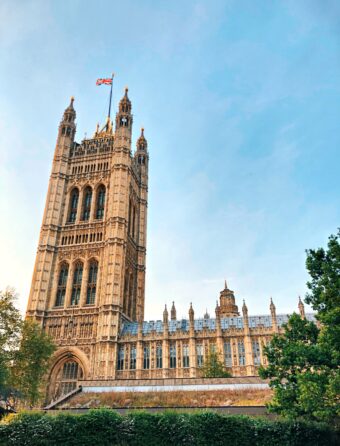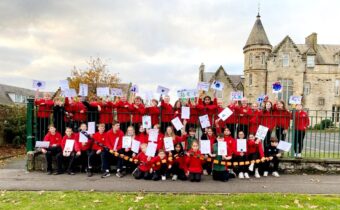
Modern Studies is the subject where we examine the big issues in an ever-changing world. The units studied will inform pupils about current affairs and give them the ability to understand the world around them; at a local, national and international level. It will teach them the ability to question and think critically, to construct detailed, persuasive arguments and is truly ‘modern’ in that pupils will learn about events happening right now, and the content is constantly being updated as a result.
The courses on offer are designed to interest pupils and challenge them to think differently about the society they live in and are shaped around key themes of rights, participation, representation and power. As a department, we pride ourselves on equipping pupils with the knowledge and skills which allow them to participate fully in society; content in the belief they will give a good account of themselves in any debate on current affairs!

S1
In S1, pupils have Modern Studies one period a week and courses look to engage pupils in current affairs and the key concepts which underpin the subject. They study the following topics at the Third/Fourth Level under Curriculum for Excellence:
- Human Rights – We examine what society is and focus on human rights and the rights of the child specifically, before we examine case studies which highlight human rights violations around the world. The case studies are child soldiers, landmines and child labour/’sweatshops’. There is also an in-depth look at North Korea under the leadership of Kim Jong Un.
- Living in a Democracy – This encompasses an overview of democratic representatives in the UK and the ways in which people can participate in a democracy. There is a particular focus on the Scottish Parliament and the unit looks at the concept of elections and includes a mock election. Pupils work in groups to create parties and manifestos and deliver candidate speeches in front of their peers and P7 pupils.
Our Democracy topic culminates in an investigation into the debate around Scotland’s constitutional future and whether or not the country should be independent. Pupils use their knowledge to develop arguments for and against independence, and an important part of this investigation is the development of research skills.
S2
In S2 pupils have Modern Studies two periods a week. They study the following topics at the Third/Fourth Level under Curriculum for Excellence:
- The USA – This unit looks at the US political system and key concepts relating to the constitution, branches of power and the Presidency. It also examines the social and economic inequality experienced by many groups and looks at the debate around issues like immigration and gun rights. Pupils explore the similarities and differences between the UK and USA; including the recent Presidential election.
- Terrorism – This unit examines what motives terrorist organisations like ‘Islamic State’ and Al Qaeda have and sees pupils looking into case studies on high profile attacks including 9/11. We will examine how terrorism has affected the UK and how we, and other nations like the USA under Donald Trump, are trying to stop the spread of terror.
- The People’s Republic of China – This is a comparative unit which studies the phenomenal growth of China as a world superpower and compares life in the USA to that in China. We will examine what communism involves and how the lives of the people differ across the country. Pupils investigate issues including the use of the death penalty and the One and subsequent Two Child Policy. A key focus in this unit is the development of decision making skills which are important for source work in S3/4.
S3-S4
At the start of S3, we begin National 4/5 Modern Studies and pupils attend three periods a week.
Pupils study three major units:
- Democracy in the UK – Study of the UK Parliament, power and influence of Pressure Groups and Trade Unions, how people can participate across the country and media involvement in politics. They will also examine in-depth the work of MPs, how they are elected and whether changes are needed to re-engage voters. They will have the chance to meet their MP and question them on the issues that matter most to them and their community. Students will develop evaluation skills by answering source based questions. In this unit there will be a focus on detecting and explaining bias and exaggeration.
- Crime and the Law – Students will study types of crime, including youth crime, as well as the impact of crime on victims, offenders and communities. They examine social, economic and biological reasons why people commit crime before looking at the justice system; the role of the police, courts and penal system. This incorporates a study of the aims of prison and whether it is the best punishment for offenders. Students will develop evaluation skills through decision making tasks concerning the social issues raised by crime and law in the UK.
- World Power – Brazil. As one of the G20 world powers, students will examine Brazil’s role internationally and its influence over other countries, including the UK. They will also look at the rights of the people, participation and the powers of Brazil’s leaders and representatives. We also address social and economic issues such as income, housing, health, crime and education, and government attempts to address these issues. In this unit there will be a focus on drawing and justifying conclusions based on sources about the country’s political, social or economic issues.
S5/S6 Higher
Pupils attend Modern Studies lessons for five periods per week at Higher.
Pupils study three major units:
Unit 1 – Democracy in Scotland and the UK.
We examine possible alternatives for the governance of Scotland and evaluate implications of the UK’s decision to leave the European Union. By focusing on the UK Parliament, we look at the work of MPs and analyse their ability to hold the UK Government to account. Strengths and weaknesses of systems to elect representatives in the UK are also studied, as well as factors which influence voting behaviour and ways in which citizens can influence Government decision-making.
Unit 2 – Social Issues in the UK – Social Inequality in the UK.
In this unit, we examine reasons why wealth and health inequalities exist in the UK, including gender, race, education, poverty and lifestyle choices. We also look at the effects of inequality on groups in society, specifically women, children and families, the elderly. The debate surrounding the Welfare State and involvement of the private sector is part of a study on Government measures to tackle inequalities as we look to assess the effectiveness of measures taken.
Unit 3 – International Issues – The United States of America
Students will study the political system, including an examination of the federal government and the associated system of checks and balances. They will assess how Americans can and do participate at state and federal level, as well as examining social and economic inequality and its impact on groups within society. We look at issues including immigration, education, housing, crime, unemployment and income and how government is trying to tackle them. The role of the world power in international relations is also featured.
S6 Advanced Higher
Pupils attend lessons four periods a week at Advanced Higher. It is expected that pupils will engage in a great deal more independent learning at this stage of their school career. Advanced Higher Modern Studies departs from the traditional political aspects of the discipline to focus more on sociological strands.
At Wellington, the study theme is Law and Order. The contexts are:
- Study Area B – Understanding Criminal Behaviour
Students examine competing explanations of why crime exists and why people commit it. This is done principally through scrutinising existing sociological and psychological theory. Students then proceed to study the relationships between criminality and different social groups before looking at the effects of crime at micro and macro level.
- Study Area C – Responses to Crime by Society
The focus of this unit is on what happens to those found guilty of committing crime and the extent to which intervention is effective. Key areas include the efficacy or otherwise of prison and the role of non-custodial sanctions, the policies of the different political parties to reform in the penal system and the ongoing debate concerning the use of the private sector.
The Dissertation is an independent research project based on an area of study from within the contexts. It is worth 1/3 of the overall grade and topics covered by Wellington students in recent years include:
‘Criminals are born not made.’
‘The perpetrators are the real victims of crime.’
‘Social deprivation and crime are inextricably linked.’
Curricular Activities and Extracurricular Clubs
The department firmly believes in providing key active learning opportunities across a student’s time in Modern Studies and is always open to suggestions and new experiences. Currently we offer, or are planning to offer:
S1 – Mock Election and trip to the Scottish Parliament.
S2 – Sky Skills Academy (interactive session with Sky centre in Livingston preparing a news report on the topic ‘Your Voice’.) and visit from former Special Branch Officer on subject of UK Terrorism.
S3 – MP Visit and interactive parliament workshops.
S4 – Visit and talk with local community police, visit to Sheriff/ High Court and/or Drug Court.
S4 – London trip (cross-curricular with History). This is a two-day residential trip to London. The main items on the itinerary are a visit to the Docklands Museum to discover more about the Slave Trade and a tour of the Houses of Parliament which also includes a workshop on elections.
S6 – Visit to a prison in the west of Scotland and engagement with key speakers from court and/or prison system
Future Studies & Careers
The most common university courses undertaken by Modern Studies students include:
- Law
- Politics
- International Relations
- Sociology
- Philosophy
- Economics
- Social Policy
- Economic and Social History
- Anthropology
- Psychology
- Urban Studies
The most common careers include:
- Law
- Journalism
- Teaching
- Academic and socio-economic research
- Social Work
- Civil Service
- Local Government